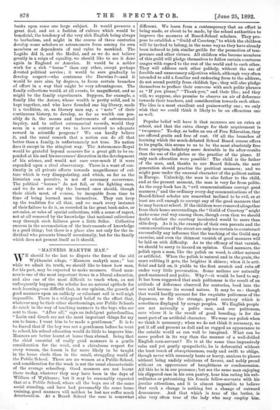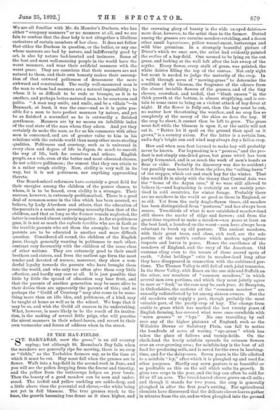"MANNERS MAKYTH MAN."
WE should be the last to dispute the force of the old Wykhamist adage, Manners makyth man ; " but while we admit its truth, we should like to know how man, for his part, may be expected to make manners. Good man- ners is one of the most important items in a liberal education, and also one of the most difficult to teach when, as not unfrequently happens, the scholar has no natural aptitude for such learning,—so difficult that, in our opinion, the growth of good manners upon an unlikely or reluctant soil is well-nigh impossible. There is a widespread belief to the effect that, whatever may be their other shortcomings, our Public Schools do much in the way of teaching manners to the boys who are sent to them. "After all," says an indulgent paterfamilias, " Latin and Greek are not the most important things for my son to learn; I want him to be made a gentleman." It is to be feared that if the boy was not a gentleman before he went to school, his school education would do little to improve him. Manners are better learnt at home than abroad. Seing that the chief essential of really good manners is a gentle consideration for the weak, and a chivalrous- respect for every woman, the lesson is far more likely to be taught in the home circle than in the small, struggling world of the Public School. There are no women at a Public School, and consideration for the weak is not the usual characteristic of the average schoolboy. Good manners are not learnt there to-day, whatever they may have been in the days of William of Wykhame; but it may be reasonably expected that at a Public School, where all the boys are of the same social standing, and have had presumably the same home training, good manners will neither be lost nor suffer much deterioration. At a Board School the case is somewhat
different. We learn from a contemporary that an effort is being made, or about to be made, by the school authorities to improve the manners of Board-School scholars. They pro- pose to establish a " Guild of Courtesy," to which the children will be invited to belong, in the same way as they have already been induced to join similar guilds for the promotion of tem- perance and other virtues. All children who become members of this guild will pledge themselves to follow certain courteous. usages with regard to the rest of the world and to each other. They will address each other politely, without the use of forcible and unnecessary adjectives which, although very often intended to add a familiar and endearing form to the address, do not sound prettily from childish lips ; they will also pledge themselves to preface their converse with such polite phrases. as " If you please," " Thank-you," and their like; and they will, we suppose, also promise to observe an air of deference towards their teachers, and consideration towards each other_ The idea is a most excellent and praiseworthy one ; we only wish that we could think it likely to be an efficacious one as well.
Popular belief will have it that manners are an extra at school, and that the extra charge for their acquirement is " twopence." To-day, as befits an era of Free Education, they are offered gratis and free of cost. Of all the branches of learning which the much-debated School Board course offers to its pupils, this seems to us to be the most absolutely free- from exception, infinitely more desirable in its after-results than the use of the globes or the practice of the piano. If only such education were possible ! The child is the father- of the man, and, thanks to our Board Schools, the next generation should practise the prettiest manners ; and we might pose under the unusual character of the politest nation in Europe. Unluckily, the man is also father to the child,. and at the present moment, the man is very far from polite. As the copy-book has it, "evil communications corrupt good. manners;" and the ordinary every-day communications of the Board-School scholar are somewhat inclined to be evil, or at• least are evil enough to corrupt any of the good manners that he may learn at school. If the children were removed altogether from their home surroundings, the " Guild of Courtesy" might make some real way among them, though even then we should doubt whether the courtesy inculcated would be more than skin-deep. As it is, the example of their own parents and the- communications of the street are only too certain to counteract successfully any influence that the teaching of the Guild may exercise, and even the thinnest varnish of good manners will be laid on with difficulty. As to the efficacy of that varnish,. we should be sorry to hazard an opinion. Good manners, the polish upon a man, like the polish on wood, is either natural or artificial. When the polish is natural and in the grain, the more rubbing it gets, the brighter it shines ; when it is arti- ficial and laid on, it yields to the first scratch and rubs off- under very little provocation. Some nations are naturally good-mannered and polite. Why ?—it would be hard to say. It has been suggested that such politeness is the result of an attitude of deference observed for centuries, bred into the race and become its second nature. It may be so : though that would hardly account for the exquisite politeness of the Japanese, or for the strange, proud courtesy which is sometimes displayed by savage peoples. We English people are not naturally a polite race, and our politeness,. save where it is the result of good breeding, is for the most part of an artificial character. We wear our polish when we think it necessary; when we do not think it necessary, we put it off and present as dull and as rugged an appearance to the outside world as can well be imagined. What can be more perfect in its way than the manner of a well-drilled English man-servant P He is at the same time impassively calm and yet gently sympathetic, he is deferential without the least touch of obsequiousness, ready and swift to oblige, though never with unseemly haste or hurry, anxious to please without being unduly solicitous of favour, and nobly proud without an appearance of haughtiness or condescension. All this he is in our presence ; bat see the same man enjoying his slippered ease in his own pantry, hear him rating his sub- ordinates or patronising his female fellow-servants with his jocular attentions, and it is almost impossible to believe that such a change is nothing but a change of outward demeanour. And that which is true of the butler, is also very often true of the lady who may employ him-
We are all familiar with Mr. du Maurier's Duchess, who has either " company manners" or no manners at all, and we are fain to confess that the dear lady is not altogether a libellous -caricature of certain members of her class. It does not follow that either the Duchess in question, or the butler, or any one whose manners are bad by nature, and indifferently good by art, is also by nature bad-hearted and insincere. Some of the best and most well-meaning people in the world have the worst manners, and wear their artificial manners with the worst grace. They are conscious that their manners are not natural to them, and their own honesty makes their assump- tion of that outward politeness of demeanour the more awkward and constrained. The really well-mannered man is the man to whom bad manners are a natural impossibility ; to whom it is as difficult to be rude or brusque, as it is to another, and perhaps better-natured man, to be courteous and polite. " A man may smile, and smile, and be a villain "—in Denmark, at least, it was the case—and so it is quite pos- sible for a man to have perfect manners by nature, and yet be as finished a scoundrel as he is outwardly a finished gentleman. Manners are by no means an infallible index of the real state of the man whom they adorn. And yet they certainly do make the man, as far as his commerce with other men is concerned, and are of greater value to him in his relations with the outside world than many other more sterling qualities. Politeness and courtesy, such as is universal in every class and degree of life in Japan, do much to smooth the way of life, both for ourselves and others. English people, as a rule, even of the better and most educated classes, do not achieve politeness ; the utmost that they can attain to is a rather rough civility. Now, civility is very well in its way, but it is not politeness, nor anything approaching thereto.
Our Board-school reformers have certainly a great field for their energies among the children of the poorer classes, to whom, it is to be feared, even civility is a stranger. Their success, however, is extremely problematical. There is a good deal of common-sense in the idea which has been mooted, we believe, by Lady Aberdeen and others, that the education of the parents is a much more pressing necessity than that of the children, and that as long as the former remain neglected, the latter is rendered almost entirely negative. As far as politeness goes, it is not so much the enfants terribles who are in fault as the terrible parents who set them the example; but how the parents are to be educated is another and more difficult -question. Considered all round, the children of the English poor, though generally wanting in politeness to each other, contrast very favourably with the children of the same class -of other nations. They are extremely good to their small brothers and sisters, and from the earliest age form the most tender and devoted of nurses; moreover, they show a won- derful loyalty towards the parents who have brought them into the world, and who only too often give them very little affection, and hardly any care at all. It is just possible that little by little the spread of education may bear fruit, and that the parents of another generation may be more alive to their duties than are apparently the parents of this; and so perhaps the " Guild of Courtesy" may also come to be some- thing more than an idle idea, and politeness, of a kind, may be taught at home as well as in the school. We hope that it 'may be so, and wish the Guild all success in its undertaking. What, however, is more likely to be the result of its institu- tion, is the making of several little prigs, who will practise the nicest manners in their school-hours, and revert to their own vernacular and forms of address when in the street.



































 Previous page
Previous page